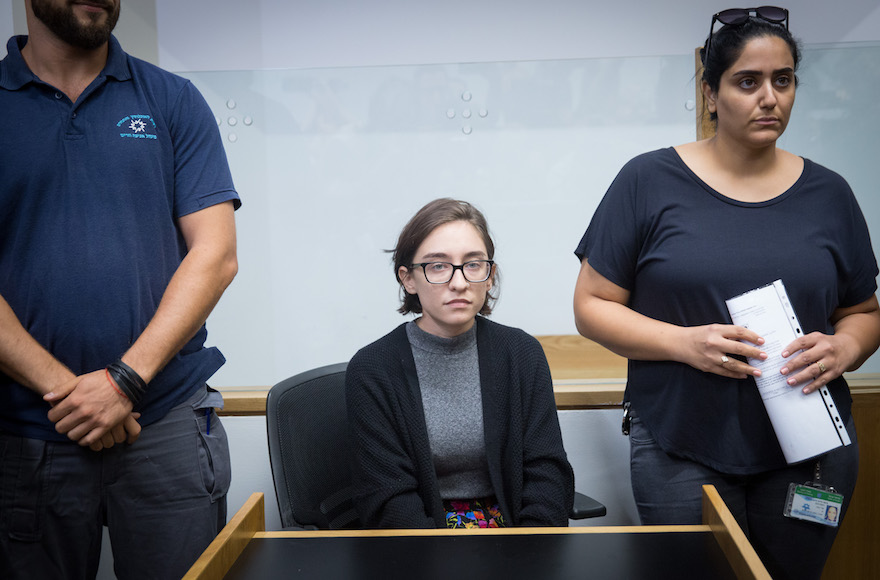(JTA) — An American graduate student being barred from entering Israel over accusations that she supports a boycott of the country has lost another round in court — and is running out of chances.
On Friday, an Israeli court rejected an appeal by Lara Alqasem, 22, in her bid to enter Israel for a one-year master’s program in human rights at the Hebrew University in Jerusalem. She has a scholarship to study there.
The Tel Aviv District Court decision, which upheld a lower court ruling last week, came as three major American Jewish groups — the Anti-Defamation League, the Reform movement and J Street, the liberal Mideast policy group — joined the university in calling for Israel to allow Alqasem to enter the country.
Alqasem can still appeal to Israel’s Supreme Court. Her deportation has been postponed until Oct. 14.
Israel barred Alqasem, a University of Florida graduate, on Oct. 2 due to her alleged support for the Boycott, Divestment and Sanctions movement targeting Israel. A 2017 law allows Israel to prohibit entry to BDS supporters. Alqasem is being held at Ben Gurion Airport.
In a statement Thursday to JTA, an ADL spokesperson said Israel should open its democratic society to its opponents.
“We stand by our earlier position that Israel’s democracy, pluralism, and open society serve as one of the best arguments against the BDS movement,” said the ADL, which said that it unequivocally opposes BDS but has previously criticized the boycott entry ban. “We believe that enabling people to see and experience Israel for themselves is the best antidote to those who seek to de-legitimize and demonize it.”
Statements from the Reform movement and J Street U, J Street’s college arm, likewise said that barring Alqasem does not accord with Israel’s democratic values.
“The Reform Movement categorically opposes BDS,” Rabbi Joshua Weinberg, the Union for Reform Judaism vice president for Israel and Reform Zionism, said in a statement Wednesday. “But at the same time, we believe this type of blunt and short-sighted approach toward activists who pose no security threat is inconsistent with Israel’s commitment to an open and free democracy.”
Hebrew University issued a statement Friday saying that the court ruling “is wrong and does not advance the struggle against BDS,” according to Haaretz. “On the contrary, it undermines the efforts of Israeli academy to attract foreign students and researchers to international programs.”
As evidence of her boycott activity, Israeli authorities have pointed to Alqasem serving as president of her campus chapter of Students for Justice in Palestine, a group that promotes BDS, while in college. Alqasem, whose grandparents are Palestinian, testified in a previous hearing that she does not support BDS.
Leaders at the University of Florida Hillel and at Gators for Israel, the campus pro-Israel group, told JTA they had no comment on Alqasem.
Her lawyer, Yotam Ben-Hillel, argued that she cannot be a BDS supporter if she has chosen to attend an Israeli university and travel to Israel on her own money.
“Alqasem came to study at the Hebrew University in Jerusalem, was accepted, paid money and issued a visa,” Ben-Hillel said, according to Haaretz. “How does this work with a boycott call? The state did not answer that.”
JTA has reached out to Alqasem’s legal team for further comment, though shortly after the ruling was issued, the Sabbath began in Israel, when most businesses close.
Israeli authorities say that Alqasem’s college activism shows that she supports a boycott of Israel, and that the country has the right to deny her entry. A lower court had ruled against Alqasem last week, upholding the state’s right to bar Alqasem’s entry due to evidence of her supporting BDS. The district court confirmed that ruling Friday.
“I have not found any reason to interfere with the [previous court’s] ruling,” Judge Erez Yekuel wrote, according to Haaretz. “This process has been valid and practical, all the relevant factors have been considered, and in the end, a detailed ruling was reached.”
Israeli Strategic Affairs Minister Gilad Erdan, who heads the state’s anti-boycott activities, praised the ruling, saying that Alqasem was an active member of a BDS group and that she had deleted her social media accounts to obscure her activism.
“The court clearly declared that a state has the right to protect itself not only in matters of security, but also to fight boycotts against its products, culture or standing,” he said in a statement Friday evening. “The judge emphasized that the decision was not made to deter visiting students because not every student serves as the president of a branch of a prominent boycott organization and tries to hide such by erasing their social media accounts.”
Erdan had previously suggested that Alqasem could enter the country if she unequivocally renounced BDS.
Israel’s consulate in Miami has defended Israel’s decision to deny her entry, thought it had given Alqasem a student visa. Lior Haiat, the consul general there, said that was because she had the correct documentation and background checks are not under the consulate’s purview.
Haiat told JTA on Thursday that Israel has every right to bar those who want to harm the country, and that the university would be better served by awarding scholarships to students who are not BDS activists.
“She’s a brilliant student, maybe, but she’s also a BDS activist,” Haiat said. “She’s got a scholarship from Hebrew University. She’s going to study on the taxpayers’ money in Israel.
He added: “We don’t want BDS activists in Israel because they call to destroy Israel. Maybe she’s not a successful BDS activist because her activism didn’t cause harm to Israel, but the intent is there.”
JTA has documented Jewish history in real-time for over a century. Keep our journalism strong by joining us in supporting independent, award-winning reporting.






